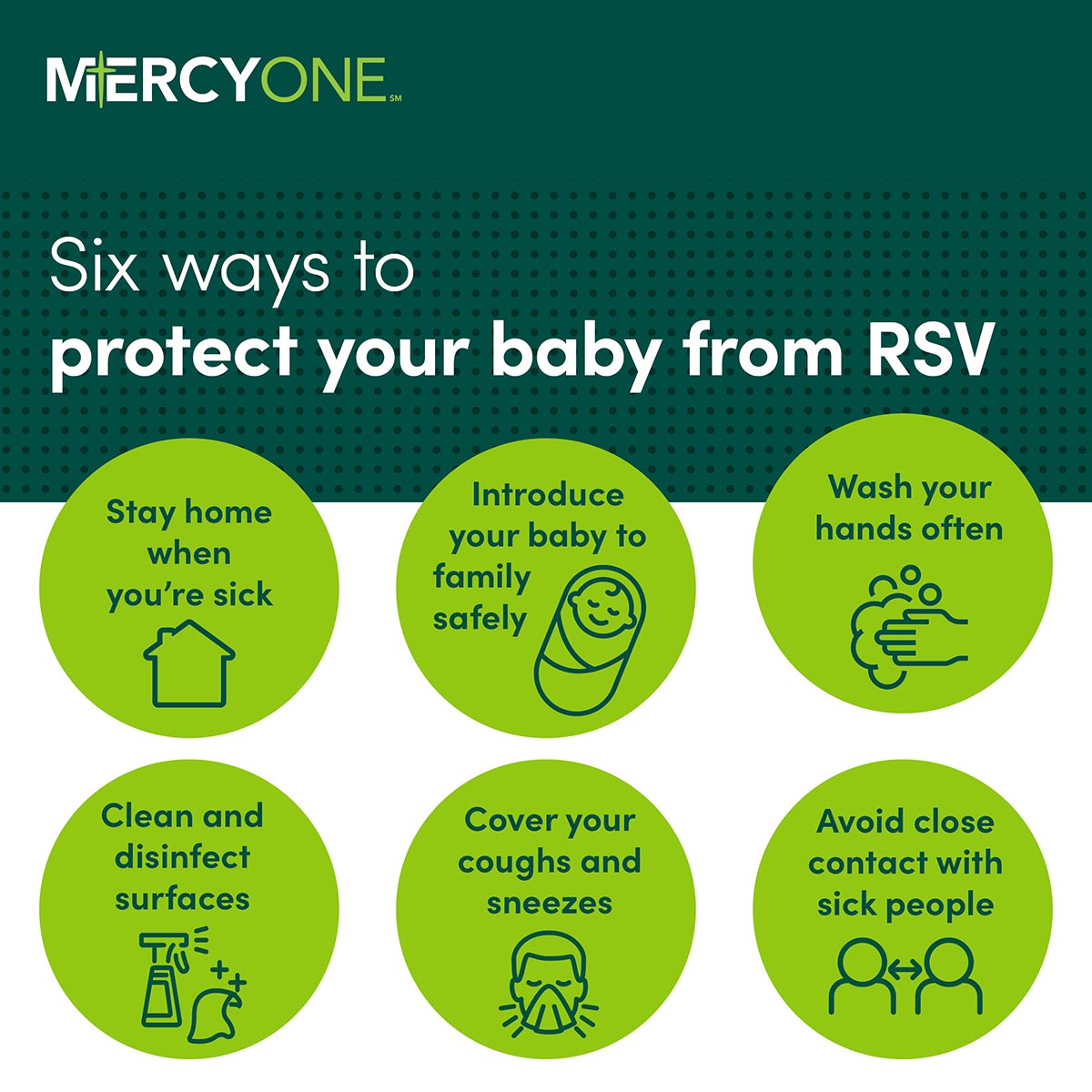
When it comes to contagious illness, our smallest humans bear the brunt of diseases because they have yet to be fully vaccinated and lack a fully developed immune system. As a pediatric hospitalist at MercyOne North Iowa Medical Center, Haley Newbrough, MD, specializes in caring for hospitalized children with varying types of illnesses. Here’s what you should know about illnesses in infants.
“During the winter months our major concern for infants, especially premature infants, is the impact of respiratory diseases,” said Dr. Newbrough. “When an infant gets a viral infection, they can become much sicker than us.”
What is RSV?
Respiratory syncytial virus (RSV) is a common illness that impacts the lungs and breathing pathways. The CDC estimated that 58,000 children younger than five years old are hospitalized each year in the United States with RSV.
“When I send home newborns, I always talk about distancing yourself, because it might just look like a cold or could be even a symptomatic for older children or adults, but it can be deadly for children,” says Dr. Newbrough. “Once a year we see a baby with RSV that is critically ill to dying, and it's a very serious illness with no simple treatment other than supportive care and helping them get through it.”
Other common respiratory illnesses to be aware of include:
- Bronchiolitis
- Enterovirus
- Influenza
- Parechovirus
How to introduce your baby to family safely?
“Your baby should not be around a lot of people the first six weeks of life – even up to two months,” said Dr. Newbrough. “During this time, they can get critically ill so definitely do not take them into big open spaces, shopping malls, department stores. People see a newborn and they want to touch and cuddle them.”
Holly and Eric Sitzmann lost their infant daughter and nearly lost their son to viral illness. The couple have now made it their mission to make sure something similar doesn’t happen to other families. “We really want to give parents the voice and empower them to say, ‘We love that you want to be around our baby, but until X amount of time has passed, we’re going to take some precautions. We’ll let you know when we’re ready for visitors.”
Dr. Newbrough recommends a few guidelines to introducing siblings and other family members to newborns.
“Have siblings touch the back of the baby’s head after they’ve washed their hands,” she said. “People want to hold babies’ hands, feet and face, but those should be avoided to prevent the spread of germs.”
Touching the back of the baby’s head is better because your newborn cannot touch their own back of the head. Babies like to put their hands into their mouths, so letting siblings touch an area where it’s not going to hurt the baby and help prevent the spread of germs is the safest way.
“Definitely DO NOT kiss any of the babies,” said Dr. Newbrough. “In addition to contagious illness this brings up another topic of herpes simplex virus (HSV).”
Most people know there is an oral HSV and a genital HSV, but the two can be located in either place and can look like a cold sore. Even if there is no cold sore present, the virus is still present.
“Upwards of 60 to 70% of the U.S. population will attest that they’ve been exposed to HSV at some time,” said Dr. Newbrough. “Kissing a baby and giving that seemingly benign virus to a neonate can cause seizures, meningitis and even death.”
So, for your baby’s sake, do not let others, even family members, kiss them.
That’s also the message from the Sitzmanns, who have championed their own non-profit organization to spread awareness.
What should you do if your child is at high risk for infection?
It is extremely important to make sure your child is up to date on all their vaccines.
“It's important that we practice good handwashing and making sure we stay home when we're sick,” said Dr. Newbrough. “RSV can be just as deadly as COVID-19, in fact more so. When your kids are sick, we have to think about those most vulnerable in our spaces.”
Whether it's school, daycare or running to the grocery store, try to keep your child home until they've had no fever for 24-48 hours and they seem to be improving. Make sure that you're doing your part and keeping our communities healthy.

